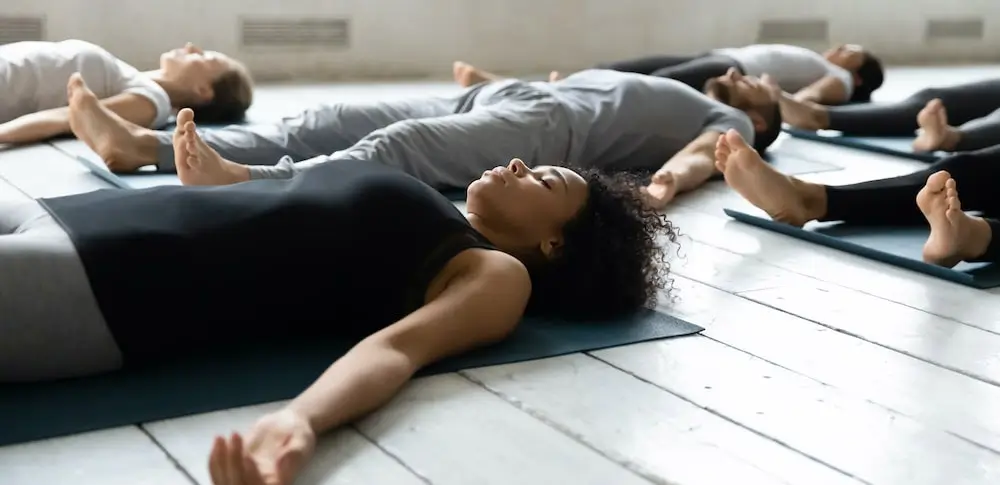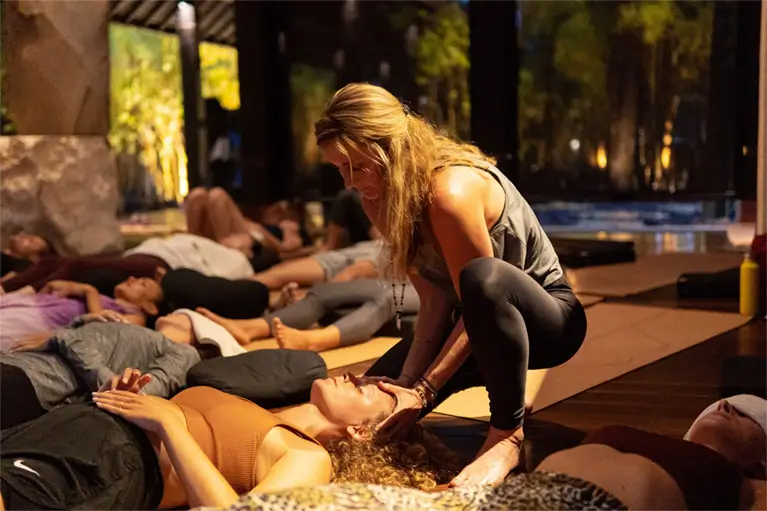What is Breathwork?
Breathwork is an ancient practice with roots in Pranayama, a branch of yoga focused on the conscious control of breath for physical and mental well-being. Coined from two Sanskrit words “prana” (life force) and “ayama” (control), “Pranayama” signifies the practice’s ability to harness and control life force energy within the body. Overall, breathwork offers a holistic approach to mind-body well-being, connecting us to our vital energy and promoting a sense of inner peace and harmony.

Experience Holosomatic Breathwork
The term “holosomatic” uses the words ‘holo’ (meaning ‘whole’ or ‘entire’) and ‘somatic’ (pertaining to the body in contrast with the mind), and as part of your holosomatic breathwork experience, you will be introduced to a method called Conscious Connected Breathwork (CCB).
CCB is a mindful breathing technique designed to enhance both physical and spiritual well-being. It involves consciously controlling the breath by maintaining a continuous, rhythmic inhalation and exhalation usually through the mouth, without pauses in between. This practice connects the mind and body, allowing you to achieve an altered state of consciousness.
Growing scientific evidence demonstrates the profound impact of breathwork on our physical and mental states. Our breath serves as a link between our emotions and physicality, becoming shallow and rapid when we’re stressed and deep and steady in moments of calm and balance. CCB leverages this connection, allowing us to consciously enhance our emotional and physical well-being.
The effects of CCB are gradually unfolding and with regular practice one can overcome the physical sensations, break up emotional blockages and step into their inner truth. After mastering the breathing, one may also be able to see visions, go deeper and reach transcendental experiences e.g. feeling connections to past life, an ancestor or even to the Universe.
Many ailments may stem from emotional imbalances or may be physical manifestations of the subconscious. And CCB being an effective tool for accessing our subconscious mind, I believe that incorporating this practice into our wellness journey can unlock profound healing potential. That’s why it is an important part of my practice.
Service Prices
Individual sessions (1:1) – in-person or online
| 1 session | CHF 100 |
| 5 sessions pack | CHF 450 |
| 10 sessions pack | CHF 900 |
Group sessions – in-person or online
| 2-4 persons | CHF 50 / person |
| 5-10 persons | CHF 40 / person |
Couple’s session – in-person or online
| 1 session | CHF 100 / couple |
How do I work with you?
I offer three primary ways to experience Holosomatic Breathwork – individual sessions, group sessions and couples’ sessions – all conducted either in-person or online to cater to your personal preferences and accessibility.
All sessions are bespoke experiences tailored to your specific needs and challenges. Through an initial consultation, we will collaboratively identify your goals and any potential roadblocks, ensuring the session becomes a focused journey towards your personal well-being. Music specially selected to enhance your breathing flow will accompany your sessions, facilitating deeper release and further enriching the experience.


Your Role in the Process
Note that you’re ultimately responsible for doing the work. While I provide a supportive and empowering environment to propel your healing journey, the journey itself is yours to undertake. Therefore, your active participation and commitment to the process are fundamental to achieving your desired results.
For further information on breathwork sessions, please refer to the FAQs.
Frequently Asked Questions
1. Who is breathwork for?
2. What are the benefits of breathwork?
Different types of Pranayama or breathwork have been found to have a spectrum of benefits for both the body and mind including:
- Stress and anxiety reduction
- Better sleep quality
- Enhanced lung function
- Stronger intercostal muscles and diaphragm, and
- Heightened spiritual consciousness
3. Are there any contraindications to doing CCB?
Breathwork is a deeply experiential exercise that can lead to intense physical and emotional releases. As a result, individuals with the following contraindications are not allowed to practice breathwork:
- Neurological conditions: epilepsy, detached retina, glaucoma, seizures or other brain/neurological conditions.
- Cardiovascular conditions: uncontrolled high blood pressure, cardiovascular diseases (including prior heart attack), strokes, TIA’s, family history of aneurysms, use of prescription blood thinners.
- Psychological disorders: mental disorders (manic disorder, bipolar disorder, schizophrenia, obsessive-compulsive disorder (OCD), paranoia, psychotic episodes, depersonalization, etc.), hospitalization for any psychiatric condition or emotional crisis within the past 10 years.
- Physical and respiratory conditions: osteoporosis or unhealed physical injuries, acute somatic and viral diseases, chronic obstructive pulmonary disease (COPD-II and COPD-III).
- Other illnesses: chronic diseases with symptoms of decompensation or terminal illness, individual intolerance of oxygen insufficiency, cancer and Low Impulse Control.
Additional Considerations
- Pregnancy: Pregnant women must consult and obtain approval from their physician before participating in breathwork.
- Asthma: Persons with asthma may participate in breathwork sessions but should bring their inhalers and consult with both their physician and the facilitator beforehand.
- Substance Use: Individuals who have been under the influence of alcohol, drugs, or any other psychedelic substances within the last 24 hours are not allowed to practice breathwork.
- Fasting: People who have been fasting in the last 72 hours are also advised against participating in a breathwork session.
4. How long does it take to be able to distract my attention from the physical sensations?
5. Is CCB safe?
CCB is completely safe and poses no harm to participants. Your dedicated facilitator is there to create a secure and supportive environment throughout the session. However, it is crucial that you familiarize yourself with the list of contraindications related to breathwork before participating in a session. If you have any doubts or concerns, speak to your facilitator or consult with your physician beforehand.
6. I’ve heard that breathwork causes hyperventilation. Is this true?
No, it’s not true. While diaphragmatic active breathing in breathwork may produce physical sensations resembling hyperventilation symptoms – such as numbness in extremities or face, pain in different parts of the body, hot and cold feelings, dizziness, etc., – these are not indicative of a harmful hyperventilation episode. Clinically indicated hyperventilation is typically induced by stress or a panic attack. The sensations and physical symptoms you might experience during breathwork are inherent to the process and can be easily controlled by returning to your normal nose breathing.
7. How do I prepare for a session?
- Eat lightly: Avoid heavy meals at least 1-3 hours before the session for optimal comfort.
- Pack the essentials: Bring or ensure access to a yoga mat, cushions, bolsters, blankets, a blindfold (optional), and tissues.
- Be punctual: Arrive or join the session on time to catch important instructions and fully engage in the experience.
- Bring creative tools: Consider packing a notebook, pen, crayons, pencils, markers, or any other tools you prefer for journaling and creative expression to capture session insights and experiences.
- Hydrate: Bring/prepare a beverage like cacao, herbal tea, or water to drink during the session.
- Create the ideal environment for online sessions: Set up a quiet and private space for an undisturbed and focused session. In addition, make sure to have a reliable internet connection and good speakers/ headphones for optimal music quality.
